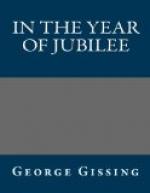‘Then I refuse to take a step,’ said Nancy. ’Leave all that to me, and I will go to live where you please, and never grumble, however poor I am. Interfere, and I will go on living as now, on Samuel Barmby’s generosity.’
There was no mistaking her resolution. Tarrant hesitated, and bit his lip.
‘How long, then, before you act?’ he inquired abruptly.
‘When my new home is found, I am ready to go there.’
’You will deal honestly with me? You will tell every one, and give up everything not strictly yours?’
‘I have done with lies,’ said Nancy.
‘Thank heaven, so have I!’
Part VI: A Virtue of Necessity
CHAPTER 1
Upon the final tempest in De Crespigny Park there followed, for Arthur Peachey, a calmer and happier season than he had ever known. To have acted with stern resolve is always a satisfaction, especially to the man conscious of weak good-nature, and condemned for the most part to yield. In his cheap lodging at Clapham, Peachey awoke each morning with a vague sense of joy, which became delight as soon as he had collected his senses. He was a free man. No snarl greeted him as he turned his head upon the pillow; he could lie and meditate, could rise quietly when the moment sounded, could go downstairs to a leisurely meal, cheered perhaps by a letter reporting that all was well with his dear little son. Simple, elementary pleasures, but how he savoured them after his years of sordid bondage!
It was the blessedness of divorce, without squalid publicity. It was the vast relief of widowerhood, without dreary memories of death and burial.
In releasing himself from such companionship, the man felt as though he had washed and become clean.
Innocent of scientific speculation, he had the misfortune about this time to read in paper or magazine something on the subject of heredity, the idle verbiage of some half-informed scribbler. It set him anxiously thinking whether his son would develop the vices of the mother’s mind, and from that day he read all the printed chatter regarding natural inheritance that he could lay his hands on. The benefit he derived from this course of study was neither more nor less than might have been expected; it supplied him with a new trouble, which sometimes kept him wakeful. He could only resolve that his boy should have the best education procurable for money, if he starved himself in providing it.
He had begun to live with the utmost economy, and for a twofold reason: the business of Messrs Ducker, Blunt & Co. threatened a decline, and, this apart, he desired to get out of it, to obtain an interest in some more honourable concern. For a long time it had been known to him that the disinfectants manufactured by his firm were far from trustworthy, and of late the complaints of purchasers had become frequent.




